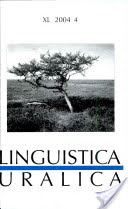Imperative and Related Matters in Everyday Estonian
Imperative and Related Matters in Everyday Estonian
Author(s): Helle MetslangSubject(s): Language and Literature Studies
Published by: Teaduste Akadeemia Kirjastus
Keywords: Estonian; spoken language; oral speech; imperative; jussive; lexicalization; grammaticalization
Summary/Abstract: The article deals with the use of the imperative and the jussive and the expression of directivity in everyday Estonian. The imperative may also be used to express an indirect command (although the jussive or the conditional could be used) and a modalized statement. Some formulas and particles develop from the imperative forms via lexicalization and/or grammaticalization. Besides the imperative, there are other means of expressing various nuances of a command. As a general rule, commands are usually softened so as to take the form of proposals or requests, whereas stronger, more direct forms are rarely used. The main strategies for softening commands include avoidance of straightforward directivity (modalized statements, questions; the conditional mood) and direct reference to the addressee of the command (subjectless sentences, experiential sentences, ambiguous personal forms).
Journal: Linguistica Uralica
- Issue Year: XL/2004
- Issue No: 4
- Page Range: 243-256
- Page Count: 14
- Language: English

